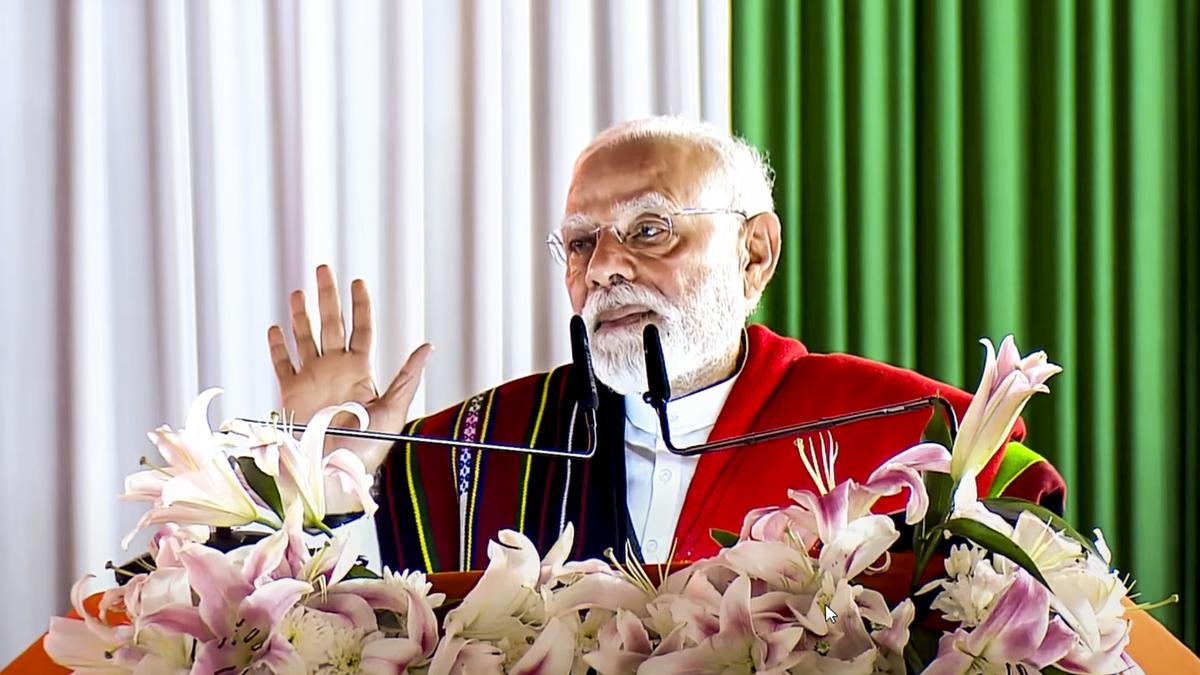Prime Minister Inaugurates Development Projects Amid Ethnic Tensions in Manipur

- 18 Sep 2025
In News:
Recently, Prime Minister Narendra Modi visited Imphal, Manipur, inaugurating and laying the foundation for multiple development projects aimed at improving infrastructure, governance, and socio-economic opportunities in the state.
The visit comes in the backdrop of ethnic tensions that erupted in May 2023 between the Meitei community in the Imphal valley and the Kuki-Zo tribes in the surrounding hills, which claimed over 250 lives and displaced more than 60,000 people.
Key Development Initiatives
- Infrastructure and Connectivity:
- Manipur Urban Roads Project: Investment of over ?3,600 crore to enhance urban road connectivity in Imphal.
- Jiribam–Imphal Railway Line: A ?22,000 crore project to connect Imphal to India’s national rail network.
- Imphal Airport Expansion: ?400 crore investment and inauguration of helicopter services to boost air connectivity.
- Civil Secretariat (?538 crore) and Police Headquarters (?101 crore) inaugurated to improve governance and law enforcement.
- Digital and IT Initiatives:Manipur Infotech Development Project aims to strengthen the state’s IT and startup ecosystem, creating employment and entrepreneurial opportunities.
- Women Empowerment:
- Four new Ima Markets (women-only markets) inaugurated, reinforcing the state’s tradition of women-led commerce.
- Construction of working women’s hostels at nine locations to support education and employment for women.
- Sports and Culture:
- Support for the National Sports University and Khelo India initiatives.
- Promotion of polo via the Marjing Polo Complex, featuring the world’s tallest polo statue.
Ethnic Conflict and Unresolved Issues
The conflict stems from the Meitei community’s demand for Scheduled Tribe (ST) status, opposed by Kuki-Zo groups. ST recognition would grant Meiteisconstitutional safeguards, including reservations in jobs, education, and political representation, and land rights in hill areas. Key unresolved issues include:
- Rehabilitation of Displaced Families: Over 280 relief camps sheltering around 57,000 people, some displaced for more than two years.
- Restrictions on Movement: Militarized buffer zones between valley and hill districts continue to limit free movement and access to services.
- Border Concerns: Porous border with Myanmar raises issues of cross-border migration, leading to the scrapping of the Free Movement Regime.
- Political Vacuum: The resignation of the Chief Minister and imposition of President’s Rule have created governance challenges.
- Dialogue Deficit: Despite reduced violence since late 2024, there is no sustained dialogue between Meitei and Kuki-Zo communities.
Demand for Separate Administration
The Kuki-Zo Council seeks administrative separation of hill areas as a Union Territory under Article 239A of the Constitution, while Meitei organizations like COCOMI oppose this, citing threats to territorial integrity.
Way Ahead
The Prime Minister emphasized the need to strengthen dialogue between the hill and valley districts to foster social harmony. Sustainable peace in Manipur requires:
- Inclusive dialogue and neutral mediation between Meitei and Kuki-Zo communities.
- Rehabilitation of displaced families with dignity and livelihood support.
- Balanced border management to address cross-border migration while respecting tribal ties.
- Strengthening local governance and administrative institutions to restore trust.
Strategic Significance
Infrastructure, IT, and women-centric initiatives are not only essential for socio-economic development but also align with the Act East Policy, facilitating regional integration and economic collaboration with Southeast Asia. Ensuring peace and development in Manipur is critical for maintaining national unity, regional stability, and long-term social cohesion.
